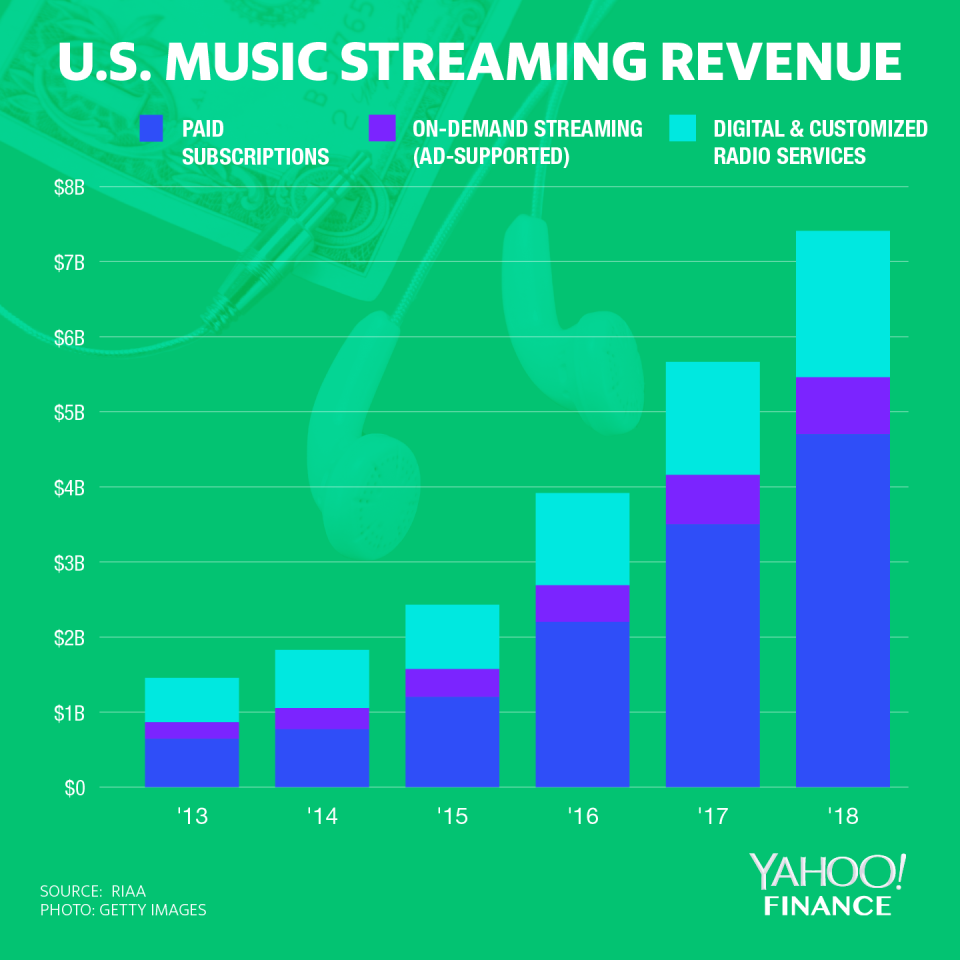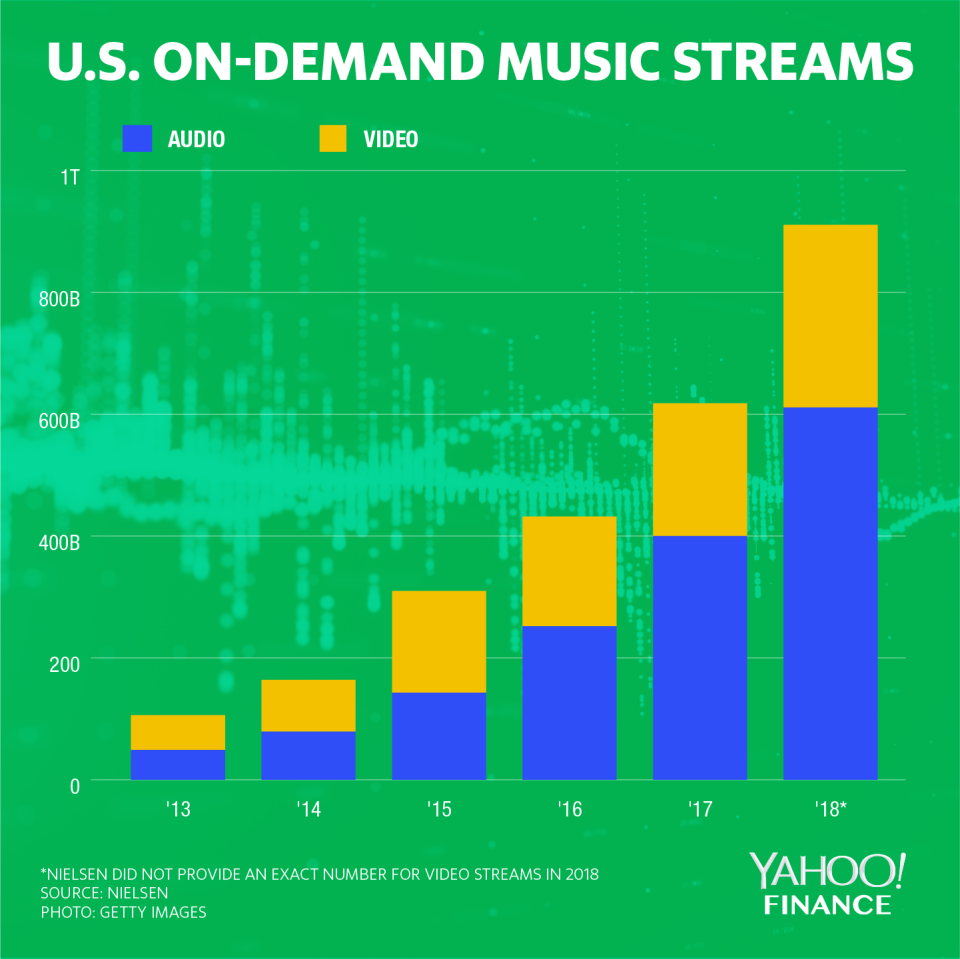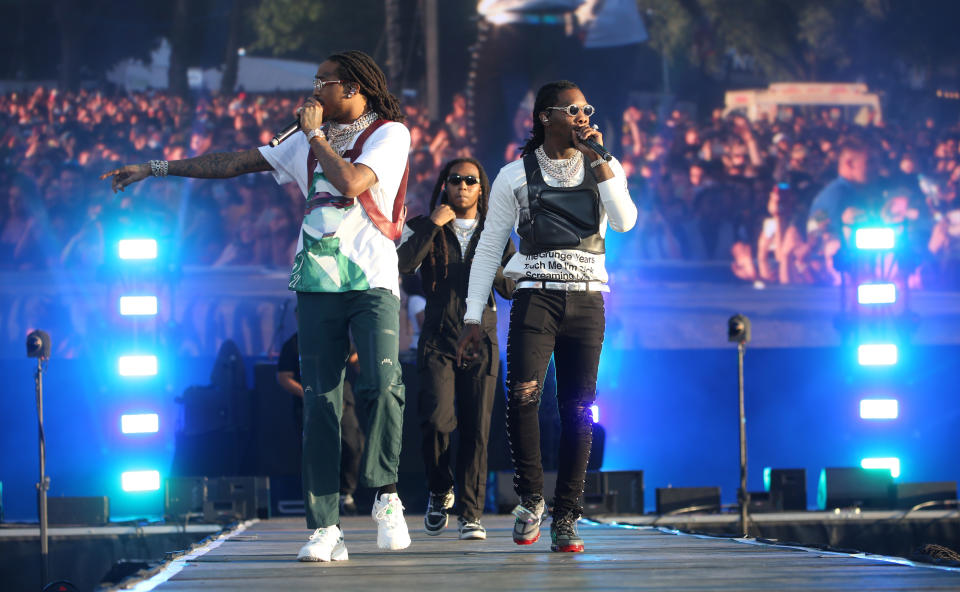The evolving artist-Spotify relationship 'mirrors the society of our times'
Streaming services like Spotify (SPOT) are now the gatekeepers to making it big in the music industry, which has left both artists and labels to change their modes of operation.
One of the largest industry sectors to see gains from the rise of streaming has been independent artists, regarded as any artist not signed to one of the Big 3 labels: Universal Music Group, Sony Music Entertainment, and Warner Music Group.
Indie artists generated $643.1 million in 2018, up 35% from 2017, according to a July report on independent artists from media insights and analytics firm Midia.
However, despite the increase in market share for these artists, many are still striving to achieve the top-line success.
“It mirrors the society of our times,” Lloyd Zane Remick, a media and entertainment attorney who is a 50-year industry veteran, told Yahoo Finance. “The upper few percent are making more. The vast majority are making less.”

A 1147% increase in on-demand audio streams
Spotify’s is reporting $1.86 billion in total revenue for Q2, with $1.67 billion coming from premium users. The total number of monthly users grew to 232 million, with 108 million of those being users who pay to use the service. The platform was expecting to add between 107 million and 110 million paid subscribers.
Despite missing on its subscriber growth estimates, Spotify — and streaming in general — is still the driving force behind industry change.
“Our goal is to perform at roughly the 70th percentile of our guidance range and we missed on subs. That’s on us,” Spotify said in a press release. “The good news is that the shortfall was execution related, rather than softness in the business, and we expect to make up the lost ground before year-end."
Between 2013 and 2018, Nielsen reported a 1147% increase in on-demand audio streams, from 49 billion to 611 billion. The Recording Industry Association of America (RIAA) reports that streaming generated more revenue than any other source in 2018, accounting for 75% — $7.4 billion — of the industry’s total $9.8 billion.
And Spotify is the lead revenue driver for indie artists. Midia reports that about 30% of indie artists rely on streaming as their primary source of income, with 75% of their recorded music revenue generated from streaming (rather than traditional album or mp3 sales).

‘I knew what it meant to the artists to sign with somebody’
Independent artists make up the fastest-growing segment of global recorded music, growing 18% year over year. And it’s on pace to continue its rise through 2019 and beyond.
Kevin Liles saw an opportunity arise when the industry majors began to consolidate, and he ran with it. He co-founded 300 Entertainment, which he described as an “artist platform,” after previously serving as an executive in the industry. Having experience as “an artist, an executive, and an owner,” Liles wanted to ensure artists’ best interests were always the priority.
“I knew what it meant to the artists to sign with somebody… to give their life to somebody,” Liles told Yahoo Finance.
The CEO said 300 Entertainment is a one-stop shop for artists to launch their careers. The company provides “marketing, promotion, social management, PR, and merch in-house” in an a la carte manner. In less than a decade, the company has landed some of the most notable names in music with client list that includes Yung Thug, Fetty Wap, and up-and-comer Megan Thee Stallion. The firm previously represented hip-hop trio Migos, who can attribute much of their success to streaming.

Signing multi-year contracts once ensured the backing of industry leaders, but much of that has changed. Henderson Cole, a New York-based media rights attorney, explained that while traditional label deals offered a sense of security for artists on the rise, streaming provides opportunities for success that don’t fit into these rigid structures.
“Majors are accepting deals where they’re not owning the masters,” Cole said. “Part of that comes down to the fact that things are successful on streaming that wouldn’t be successful other places.”
1 million streams = $4,000 for an artist
“Old Town Road” by Lil Nas X — which recently broke the record for longest running Billboard Hot 100 No. 1, spending 17 weeks atop the chart — is the perfect example of this. Migos’ second album, Culture II, which debuted last February, also fits the streaming trend.
Migos’ record debuted at No. 1 on the Billboard 200 in large part to on-demand consumption. Of the 199,000 album-equivalents tallied the week of Culture II’s debut, 150,000 came from streaming. (In 2014, Billboard recalibrated how it counts album sales to include traditional album sales, track equivalent albums, and streaming equivalent albums.) The 150,000 “sales” equaled about 225.6 million on-demand streams of songs from the album during the tracking week, according to Billboard.

Those big numbers don’t exactly bring in big paydays, though. Royalty rates for artists are one of the most hotly debated issue in today’s music industry.
The Copyright Royalty Board earlier this year ruled that streaming services would need to increase royalty payouts by 44% for artists over the next three years. The industry’s major players, including Spotify, Google (GOOG), Pandora (SIRI), and Amazon (AMZN) appealed the decision.
Nils Lofgren, longtime member of Bruce Springsteen’s E Street Band, recently posted a picture of a check he said showed royalties from streaming. The total was $7.01.
Here is a check from streaming. This one is a big one. pic.twitter.com/NGTEYyNjzj
— Nils Lofgren (@nilslofgren) August 3, 2019
Cole, the rights attorney, began explaining the complicated calculations for streaming royalty rates before conceding, in simpler terms, that 1 million streams will bring in about $4,000 for an artist. Spotify pays out more for premium streams, for example, but the system changes platform by platform and often year to year. Spotify did not return a request for comment on this article.
Because of the complexities of royalty rates in the streaming era, Cole said the industry is stuck playing catch-up. Streaming giants “keep the system from changing because no one really understands it,” he added.
Major labels still chase ‘a 100% success rate’
Between navigating financial stability and building a brand, artists are left to pick up where labels left off after streaming shook up the industry.
Adrian Galvin, who performs under the moniker Yoke Lore, called it a bit of a Catch-22. He explained that “at some point, labels stopped wanting to have the responsibility to develop artists.”
But while that could be viewed negatively by some, since without a label artists are left without the financial capital to do big things, the result hasn’t been all bad.
A self-proclaimed control freak, Galvin said that remaining DIY allows him to pursue whatever feels right for him, which is a freedom not a lot of people understand the importance or rarity of.

“When you’re in the big leagues, so to speak, it has to be a sure thing. There are no risks being taken at these really high levels,” Galvin said. “They need a 100% success rate. It would be great to have a 100% success rate, but I get to fail.”
Cole, the New York-based attorney, agreed.
“Because money is so tight, [major labels] can’t afford to take risks,” he said. When they do and it does fail, “they cut loose quick, but [that lack of security is] not a good way for anyone to produce anything.”
‘Just as much influencer as artist’
Streaming has created a new industry that independent artists, in particular, have to navigate with much less institutional backing.
And as trends continue toward catering to streaming success — Lil Nas X was pursued by and later signed with Sony’s (SNE) Columbia Records soon after “Old Town Road” went viral — the question remains: How can countless artists who aren’t in the top 1% can reach financial success through a music career?
They’re “the people who aren’t huge enough to market themselves, but also are successful enough that they want to [pursue music] full time,” Cole explained.
It’s the reason why many artists seek out some kind of advertising deal. Even Taylor Swift isn’t immune to the corporate partnership. The pop superstar recently linked up with Capital One (COF) to promote her upcoming album and the company’s newest credit card. Swift also performed at Amazon’s Prime Day Concert earlier in July, along with Dua Lipa, SZA, and Becky G.

And the right brand partnership could prove to be more lucrative than any singular album cycle.
“There are some artists now that are just as much influencer as artist,” Cole said.
‘The whole system could break apart if it gets bad enough’
What’s next for an industry that has pushed even some of its highest earning artists toward brand partnerships and sponsored content?
“At a certain point, the whole system could break apart if it gets bad enough,” Cole said.
He tried to imagine the next iteration of music invention, much the same way streaming has replaced vinyl, CDs, tapes, and mp3s, but “it’s hard to think of something to sell that would be just your music.”
Remick, the 50-year industry veteran attorney, said he sees even “more of a free-flow of music out to the masses by subscription, which will hurt individual artists. The record industry as we know it will be changing.”
Regulation, much like the royalty rate increase approved by the Copyright Board and appealed by the streaming giants, is the key hope for any real progressive change.
“Streaming needs to better serve artists,” Cole argued.
In any case, Galvin remains inherently optimistic about musicians.
“Artists are the reason this stuff exists,” Yoke Lore said. “The resilience of music will win out.”
Editor’s Note: Migos is no longer with 300 Entertainment. A previous version of this post stated the trio is still currently signed with the company.
—
Katie is an associate editor at Yahoo Finance. Follow her on Twitter.
Read More:
‘That wasn’t her decision’: Why Taylor Swift’s record label beef misses the point
Is Kylie Jenner a 'self-made' billionaire? Two experts give their thoughts
Streaming boom becomes 'holy grail' for resurgent music industry
Follow Yahoo Finance on Twitter, Facebook, Instagram, Flipboard, SmartNews, LinkedIn, YouTube, and reddit.